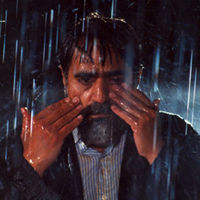TORONTO FILM FESTIVAL: "The Willow Tree" by Majid Majidi
Exclusive interview with Iranian Filmmaker Majid Majidi and film co-writer Fouad Nahas.
Published Sep 29, 2005
[an error occurred while processing this directive]
Edit page New page Hide edit links
“The Willow Tree” is one of the best examples of Existentialism as a narrative that I have seen. Man by his very nature seeks to BECOME but is prevented by outside forces beyond his control. This is the story of a blind man who is presented with an opportunity to regain his sight after over 40 years of total blindness.
The Willow Tree recently had its North American Premiere In the Contemporary World Cinema section of the 2005 Toronto International Film Festival. Majid Majidi’s previous feature "Baran" won the Grand Prize at the 2001 Montreal Film Festival, Majidi’s third Grand Prize of the Americas in as many appearances at Montreal. His other films include "The Color of Paradise" which triumphed at the international box office and became the highest grossing Iranian film in the United States, and "Children of Heaven", the first Iranian film nominated for an Academy Award in the best foreign-language film category.
We were very aware of Existentialism when we wrote it. It was core for what the film is about. But also, because the philosophy of Iran is linked to the Metaphysical and Spirituality the film has two sides.
There are pleanty of metaphors of light from darkeness in ”The Willow Tree” but it is the story itself that provides this message of hope. However, this hope will last only as long as the complicated operation will hold. Mr. Majidi’s “The Willow Tree” asks this question. “In the end, is it sight that will bring a blind man true happiness?”
“The Willow Tree” is masterfully shot in Iran and France. Visual locations are chosen as much for their photographic qualities as they are just to watch a blind man “feel” them. Water, concrete, pavement, iron bars, air, and dirt. In a climax scene the lead, played by Parvis Parastui, even ends up in a water fountain.
I asked Mr. Majid to share his thoughts about his film. Mr. Fouad Nahas (co-writer of the film and the actor who plays the Paris Doctor) acted as translator for this interview.
Is your film meant to be a philosophical journey of existentialism or did I get it wrong? Is it actually about religion and Mans personal relationship with God?
We were very aware of Existentialism when we wrote it. It was core for what the film is about. But also, because the philosophy of Iran is linked to the Metaphysical and Spirituality the film has two sides.
Why did you choose France as your secondary shooting location?
Actually, it was for practicality. It was easier for us to get visas for all of our Iranian film crew. At first we thought Spain, and then London. France helped us in every aspect. And even the hospital we shot in. The people were very helpful. It is easy to work in Paris.
What is it like shooting in Iran?
It is very easy to work in Iran. The people there are very aware of cinema. The police will help you on the spot. We had many locations and shot over 5 months in Iran. But we did have to do our Dolby sound mix in Paris. There wasn’t anyone in Iran with that specialized equiptment.
Your film has English subtitles and your translation for the name of God is, well “God”. I was curious about that. I thought that the middle-eastern translation was Allah? Did you choose “God” as the translation to simplify it for an American audience?
It’s a good question. Actually in Iran our word is “Khoda.” We speak Persian in Iran and the word would be “Khoda.” Many Americans think that. But just as every religion has it’s own special name so too does every country. Also, one of [Mr. Majidi's] movies in English is translated to the "Color of Paradise." The Persian name is actually "Rang-e Khoda."
The ending. How did you come up with the ending?
We didn’t want the end to be dark. We see the blind man having gone out of Paradise, but we didn’t want him to be alone. God, or someone protecting him was still present even though he is a man who lost everything. We wanted to have hope at the end of this film. We didn’t want it to end dark and hopeless.
Is your lead actor Parvis Parastui well know in Iran?
Oh, yes. His is one of the most known actors in Iran. He has a kind discipline and people really love him. Casting for the lead role was difficult. At first I thought he would be too old for the role. The I spoke with him about it and he read the script and he told me that he would do anything to play this role.
He spent 3 months learning to walk and learning the behavior and gestures. It was very obvious he was the best person for this role and we are very happy with the result.
[In Technology]
Additional Events at ProFusion 2011, DV Expo East, and Columbia College Chicago May 26, 2011
[In Resources]
Fest to fete special guests Vera Farmiga, Paul Haggis; Mike O’Malley joins Anne Meara as hosts of Late Night Storytelling May 26, 2011




Add a Comment
Please be civil.